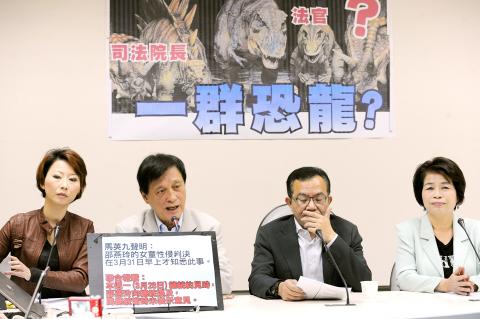Opposition lawmakers yesterday slammed President Ma Ying-jeou (馬英九), saying he had shirked responsibility by insisting he was not aware of Supreme Court Judge Shao Yen-ling’s (邵燕玲) controversial ruling in a sexual assault case before nominating her to the Council of Grand Justices.
Ma apologized yesterday for his initial nomination of Shao for a seat on the Council of Grand Justices on Thursday after a public outcry over a controversial ruling handed down by a collegial panel led by Shao last year on the sexual assault of a three-year-old girl.
Democratic Progressive Party (DPP) Legislator Gao Jyh-peng (高志鵬) blasted Ma’s defense as an attempt to “shirk responsibility.”

Photo: Lo Pei-der, Taipei Times
“Ma’s remarks were unacceptable,” Gao told a press conference. “Just because Shao did not tell Ma [about her controversial ruling] and Ma did not know does not mean Ma was not in the wrong.”
DPP Legislator Twu Shiing-jer (涂醒哲) said Ma himself chose the wrong person and yet he was letting Vice President Vincent Siew (蕭萬長), who headed the special task force recommending and screening candidates, shoulder the responsibility.
Saying the incident showed a lack of thoroughness in the screening process for the nomination, Gao suggested all Council of Grand Justices nominees be reconsidered.
The DPP caucus added that changing a nominee and offering apologies are not enough, asking the Ma government to make clear what went wrong in the nomination process.
If Ma failed to clear up the matter, it is the president himself who should be replaced, the lawmakers said.
In reference to the so-called “dinosaur” judges deemed unfit for the positions, DPP Deputy -Secretary-General Wong Chin-chu (翁金珠) called the Ma administration “an administration of dinosaurs.”
DPP Legislator Wang Sing-nan (王幸男) also ridiculed Ma’s choices of nominees, saying he might as well nominate singer Lotus Wang (王彩樺), who could at least give the people a semblance of hope by singing her song Bo Peep Bo Peep (有唱有保庇), which is about asking deities for protection and good luck.

NATIONAL SECURITY THREAT: An official said that Guan Guan’s comments had gone beyond the threshold of free speech, as she advocated for the destruction of the ROC China-born media influencer Guan Guan’s (關關) residency permit has been revoked for repeatedly posting pro-China content that threatens national security, the National Immigration Agency said yesterday. Guan Guan has said many controversial things in her videos posted to Douyin (抖音), including “the red flag will soon be painted all over Taiwan” and “Taiwan is an inseparable part of China,” while expressing hope for expedited “reunification.” The agency received multiple reports alleging that Guan Guan had advocated for armed reunification last year. After investigating, the agency last month issued a notice requiring her to appear and account for her actions. Guan Guan appeared as required,

A strong cold air mass is expected to arrive tonight, bringing a change in weather and a drop in temperature, the Central Weather Administration (CWA) said. The coldest time would be early on Thursday morning, with temperatures in some areas dipping as low as 8°C, it said. Daytime highs yesterday were 22°C to 24°C in northern and eastern Taiwan, and about 25°C to 28°C in the central and southern regions, it said. However, nighttime lows would dip to about 15°C to 16°C in central and northern Taiwan as well as the northeast, and 17°C to 19°C elsewhere, it said. Tropical Storm Nokaen, currently

‘NATO-PLUS’: ‘Our strategic partners in the Indo-Pacific are facing increasing aggression by the Chinese Communist Party,’ US Representative Rob Wittman said The US House of Representatives on Monday released its version of the Consolidated Appropriations Act, which includes US$1.15 billion to support security cooperation with Taiwan. The omnibus act, covering US$1.2 trillion of spending, allocates US$1 billion for the Taiwan Security Cooperation Initiative, as well as US$150 million for the replacement of defense articles and reimbursement of defense services provided to Taiwan. The fund allocations were based on the US National Defense Authorization Act for fiscal 2026 that was passed by the US Congress last month and authorized up to US$1 billion to the US Defense Security Cooperation Agency in support of the

PAPERS, PLEASE: The gang exploited the high value of the passports, selling them at inflated prices to Chinese buyers, who would treat them as ‘invisibility cloaks’ The Yilan District Court has handed four members of a syndicate prison terms ranging from one year and two months to two years and two months for their involvement in a scheme to purchase Taiwanese passports and resell them abroad at a massive markup. A Chinese human smuggling syndicate purchased Taiwanese passports through local criminal networks, exploiting the passports’ visa-free travel privileges to turn a profit of more than 20 times the original price, the court said. Such criminal organizations enable people to impersonate Taiwanese when entering and exiting Taiwan and other countries, undermining social order and the credibility of the nation’s